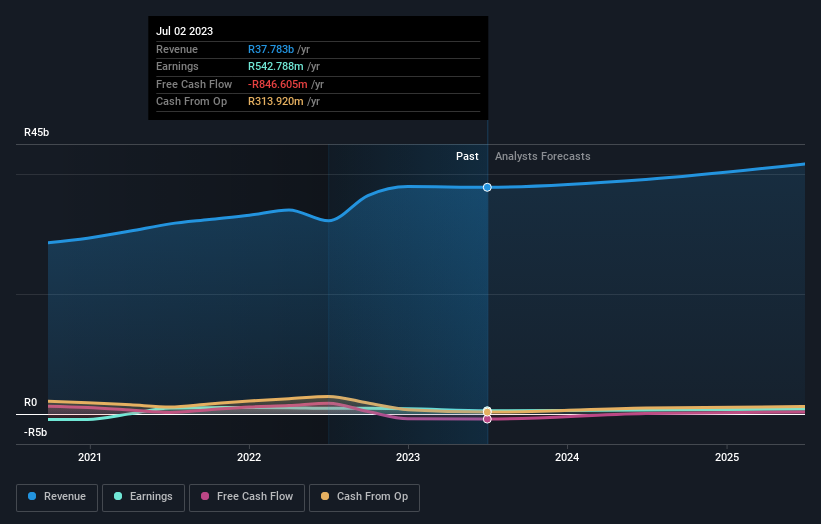Stock Analysis
- South Africa
- /
- Food
- /
- JSE:RCL
The past five-year earnings decline for RCL Foods (JSE:RCL) likely explains shareholders long-term losses

While not a mind-blowing move, it is good to see that the RCL Foods Limited (JSE:RCL) share price has gained 18% in the last three months. But over the last half decade, the stock has not performed well. In fact, the share price is down 20%, which falls well short of the return you could get by buying an index fund.
Although the past week has been more reassuring for shareholders, they're still in the red over the last five years, so let's see if the underlying business has been responsible for the decline.
See our latest analysis for RCL Foods
In his essay The Superinvestors of Graham-and-Doddsville Warren Buffett described how share prices do not always rationally reflect the value of a business. By comparing earnings per share (EPS) and share price changes over time, we can get a feel for how investor attitudes to a company have morphed over time.
RCL Foods became profitable within the last five years. Most would consider that to be a good thing, so it's counter-intuitive to see the share price declining. Other metrics may better explain the share price move.
Revenue is actually up 9.5% over the time period. So it seems one might have to take closer look at the fundamentals to understand why the share price languishes. After all, there may be an opportunity.
The company's revenue and earnings (over time) are depicted in the image below (click to see the exact numbers).

We know that RCL Foods has improved its bottom line over the last three years, but what does the future have in store? Take a more thorough look at RCL Foods' financial health with this free report on its balance sheet.
What About The Total Shareholder Return (TSR)?
We've already covered RCL Foods' share price action, but we should also mention its total shareholder return (TSR). Arguably the TSR is a more complete return calculation because it accounts for the value of dividends (as if they were reinvested), along with the hypothetical value of any discounted capital that have been offered to shareholders. Its history of dividend payouts mean that RCL Foods' TSR, which was a 8.2% drop over the last 5 years, was not as bad as the share price return.
A Different Perspective
While the broader market lost about 1.1% in the twelve months, RCL Foods shareholders did even worse, losing 15%. Having said that, it's inevitable that some stocks will be oversold in a falling market. The key is to keep your eyes on the fundamental developments. Unfortunately, last year's performance may indicate unresolved challenges, given that it was worse than the annualised loss of 1.6% over the last half decade. We realise that Baron Rothschild has said investors should "buy when there is blood on the streets", but we caution that investors should first be sure they are buying a high quality business. While it is well worth considering the different impacts that market conditions can have on the share price, there are other factors that are even more important. Case in point: We've spotted 1 warning sign for RCL Foods you should be aware of.
If you are like me, then you will not want to miss this free list of growing companies that insiders are buying.
Please note, the market returns quoted in this article reflect the market weighted average returns of stocks that currently trade on South African exchanges.
Valuation is complex, but we're helping make it simple.
Find out whether RCL Foods is potentially over or undervalued by checking out our comprehensive analysis, which includes fair value estimates, risks and warnings, dividends, insider transactions and financial health.
View the Free AnalysisHave feedback on this article? Concerned about the content? Get in touch with us directly. Alternatively, email editorial-team (at) simplywallst.com.
This article by Simply Wall St is general in nature. We provide commentary based on historical data and analyst forecasts only using an unbiased methodology and our articles are not intended to be financial advice. It does not constitute a recommendation to buy or sell any stock, and does not take account of your objectives, or your financial situation. We aim to bring you long-term focused analysis driven by fundamental data. Note that our analysis may not factor in the latest price-sensitive company announcements or qualitative material. Simply Wall St has no position in any stocks mentioned.
About JSE:RCL
RCL Foods
Through its subsidiaries, engages in the food business in South Africa.
Flawless balance sheet with reasonable growth potential.


